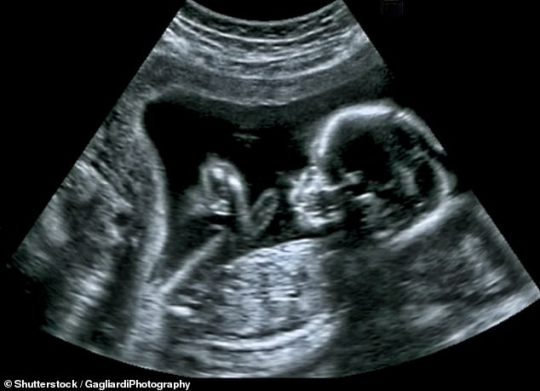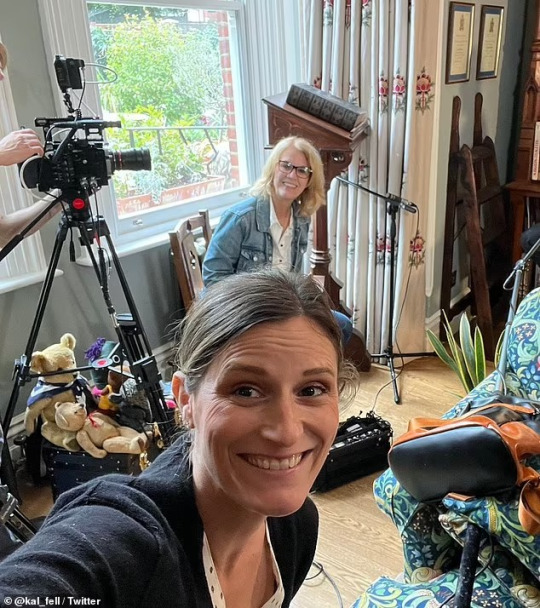#lahl
Photo

*Event Alert* Join "Healthy You Lauderhill" at our free event: Post COVID-19 Community Chat - Creating Value in Our Health Series. Say “YES” to a Healthy You All 2023! A Pre-Valentine's Day event focused on Art, Health and YOU. Join us for great conversation while you master your DIY (do it yourself) art skills with a handcrafted Valentine Inspired piece at the 5-Star Nailed it DIY Studio Fort Lauderdale. Don’t worry, you don’t need a plus one. Come prepared to mix and mingle and have a few bites. There is no cost to Lauderhill residents. Registration is required. Event Date: February 13th Time: 6:30PM - 8:30pm Location: Nailed It Art Studio 5139 N. University Dr., Lauderhill, FL https://bit.ly/LAHLChatVDay City of Lauderhill Lauderhill, Florida #covid19 #lahlmobile #lahl #covidawareness https://www.instagram.com/p/Coau5bTu63J/?igshid=NGJjMDIxMWI=
0 notes
Text



Queering the medical ethics of pregnancy to problematize a desire for “normal fetal outcomes” is an abandonment of evidence-based medicine and the principle of “do no harm.”
By: Jennifer Lahl MA, BSN, RN and Kallie Fell, MS, BSN, RN
Published: Jul 18, 2023
In recent years, a striking paradigm shift in medical ethics has emerged, driven by progressive political ideologies purporting to champion “Social Justice.” This shift has precipitated a surge in initiatives centered around diversity, equity, and inclusion (DEI). The resulting effects have varied considerably; they include the introduction of explicit racial bias in treatment protocols in a quest for “health equity,” and an unsettling disregard for biological sex as an important variable in both medical research and patient care. Instead, the new radical movement favors categorizing individuals based on their self-identified and medically irrelevant “gender identity.”
Even more alarmingly, we are witnessing a direct assault on the language associated with women’s health in medicine. Terms traditionally used in clinical settings, such as “mothers,” are being replaced with neutral alternatives like “birthing parents.” Similarly, the term “women” is frequently substituted with “individuals with a cervix,” even though nearly half of women don’t know what a cervix is and such language may therefore cause a significant number of women to forgo important routine cervical screenings.
This trend of overlooking biological sex as a critical medical variable stems from an ideological drive to “queer” the natural world. The proponents of this view resist categorization, arguing that such practices are instruments of oppression wielded by the powerful against the less powerful. According to this perspective, medicine must eschew not only biological categorization of patients, but also traditional notions of what is deemed desirable or adverse patient outcomes.
These ideological shifts have raised substantial concerns regarding potential harm that such denial of biological realities could inflict on patients. However, recent academic discourse has escalated these concerns to new levels. A provocative new paper in the journal Qualitative Research in Health titled “Medical uncertainty and reproduction of the ‘normal’: Decision-making around testosterone therapy in transgender pregnancy” by Pfeffer and colleagues propels us further down the road of medical malpractice.
The authors, a group of transgender sociologists and enthusiasts, and healthcare activists, with not one medical degree among them, argue to dramatically move the goal posts of medical ethics, choosing to completely disregard the health, safety, and well-being of the developing fetus, all in the name of “trans” inclusion. Abiding by their paper’s guidance would land us in a vacuum devoid of medical ethics and a seismic shift away from the importance of scientific research and medical evidence in favor of activist directed healthcare.
The authors argue that “gendered” pregnancy care is too focused on helping women have healthy babies, and that it might be okay for transmen to continue taking testosterone during pregnancy despite the known health risks to the fetus and effects on its normal development. The desire for “normal fetal outcomes,” according to the authors, is rooted in a problematic desire “to protect their offspring from becoming anything other than ‘normal’” and “reflect historical and ongoing social practices for creating ‘ideal’ and normative bodies.”
This is, quite frankly, insane.
In the paper, Pfeffer et al. maintain that:
[L]acking and uncertain medical evidence (HRT with testosterone during pregnancy and chest feeding) in a highly gendered treatment context (pregnancy and lactation care), both patients and providers tend to pursue precautionary, offspring-focused treatment approaches.
We argue that medical ethics exists to guide medical providers and protect both the expectant mother and her future offspring.
The authors of the article strive to underscore the prevailing power dynamic and expertise discrepancy between medical professionals and their pregnant patients. They also highlight “lack of training on trans pregnancy care,” and the failure of the current “precautionary approach” within a “highly-gendered space of pregnancy care.” However, conspicuously absent is any robust, concrete data to substantiate their claims. Instead, they bolster their argument by cherry-picking quotations from their study involving a pool of 70 international “trans” individuals and 22 “health care providers who self-identified as focusing their practice with trans populations.”
Before continuing, we must point out the obvious flaw in the article: pregnancy care isn’t “gendered,” it’s sexed. Only the biologically fertile human females of our species possess the physical attributes necessary for pregnancy and childbirth. This is a simple biological reality.
Let us now turn our attention to the role of a physician in caring for a pregnant woman and the developing fetus.
The doctor-patient relationship is sacred, considered to be the core element in the ethical principles of medicine. Medicine’s practice, at its heart, is a moral undertaking, thus conferring upon the physician the fiduciary duty of ‘primum non nocere’—first, do no harm. In the seminal work Principles of Biomedical Ethics by Tom Beauchamp and James Childress, they delineate the four fundamental principles of medical ethics, often known as the “Georgetown Mantra”:
Beneficence: the duty to “do good”
Non-maleficence: the duty to “not do bad”
Respect for Autonomy: respecting a patient’s right to self-determination
Justice: the principle to treat all people equally and equitably
In the context of pregnancy, the physician must uphold these principles towards both the mother and her unborn child(ren).
The authors of the new paper are quick to point out the power and expertise imbalance between doctors and patients. This is neither a new nor concerning arrangement. Firstly, it is expected and indeed desirable that our physicians possess deeper knowledge and expertise in the field of medicine. We seek their counsel precisely because of their expertise, and in matters of pregnancy, we particularly rely on those with training in midwifery or obstetrics and gynecology. When complications arise during pregnancy, we consult specialists trained in managing high-risk cases or practitioners of maternal-fetal medicine.
Secondly, women are keenly aware of the potential power disparities, or injustices, that exist in medicine, notably in obstetrics and gynecology. This field, with historical roots in unethical practices and racism, often compels women to forego modesty and disclose their vulnerabilities. But one doesn’t need to enter a maternity ward to understand the difference between how men and women are treated in medicine. Generally speaking, women are often not accorded the same degree of seriousness as men in healthcare, particularly concerning pain. Research has shown that women’s pain and suffering are more frequently dismissed or misdiagnosed, especially among women of color. Instances of women being prescribed sedatives instead of pain medication, and misdiagnoses during heart attacks, are sadly commonplace.
A recent episode of The Retrievals, a podcast by The New York Times, titled “The Patients,” unveiled startling experiences of women at the Yale fertility clinic who underwent intense, unexpected pain during egg retrieval procedures. These women recount how “their pain was not taken seriously” and “they were not believed.” It emerged that a nurse at the clinic had been illicitly swapping fentanyl for saline. Even after this revelation, the center seemed to downplay the harm and pain suffered by these women, who had endured excruciating medical procedures with saline salt water as a substitute for anesthesia. These imbalances and injustices are not isolated to “trans” patients and should not be co-opted as a rationale for altering medical guidelines or evidence-based care, especially regarding the most vulnerable among us—the unborn child. Rather, these disparities should move medical professional societies, such as the American Congress of Obstetrics and Gynecology (ACOG) and the Endocrine Society, to uphold the highest standards of medical practice, grounded in empirical evidence and biological fact, irrespective of a patient’s sex.
The cornerstone of a patient’s trust lies in their belief that their physician’s recommended treatment plan will consistently be informed by these four core principles of medical ethics outlined above.
The concerns raised by Pfeffer and colleagues focus on the modern treatment approach physicians take, which they deem excessively “precautionary” and “offspring-focused.” Fortunately, caring for the child and the mother are neither mutually exclusive nor zero-sum. In situations where a woman aspires to become pregnant and commits to motherhood, physicians can provide care that optimizes outcomes for both parties while minimizing potential harm. If a woman chooses to continue a pregnancy, doesn’t the developing fetus also have a right to the four principles of medical ethics? In such cases, the physician is duty-bound to care for both the child and the mother. There will of course be circumstances when the mother may need to cease a particular medication or treatment to safeguard the fetus, and the physician must provide comprehensive counsel to the family, elucidating the risks and rewards involved for both the mother and the vulnerable life developing in utero.
One doesn’t have to look hard to find a list of drugs and substances that are known to be harmful to a developing fetus. Yet, for numerous other substances, safety remains indeterminate due to insufficient research. Pregnant women participating in clinical trials present intricate ethical challenges, potentially subjecting unborn babies to an array of unanticipated iatrogenic issues. Further, scientists might be hard-pressed to find a mother who would be willing to risk the health of her unborn child to advance scientific or medical understanding. Given the nature of the type of research that would be needed to satisfy the safety threshold for women remaining on their high dose testosterone throughout their pregnancy and breast-feeding period, we can again imagine a very small subset of pregnant women who would be willing and eligible to participate in this research endeavor.
This raises serious questions: Should we allow unborn children to be the subjects in medical research? Should we allow breastfeeding, newborn infants to be subjects in clinical trials? This concern is highlighted in the statement of a participant from the study under scrutiny, who pondered, “If I take testosterone, will that reduce my milk production? Will it transfer to my kid? I don’t know. Again, we don’t have any information on that because nobody lets cis women take testosterone and breastfeed” (emphasis our own).
Current research is already probing the effects of testosterone on breast milk production and its impact on breastfeeding infants. One unsurprising preliminary finding suggest that elevated testosterone levels adversely affect milk production. The La Leche League notes that “testosterone interferes with the hormone necessary for lactation (prolactin) and can cause a significant decrease in milk supply” and may shorten the the length of time a baby is able to breastfeed and increases the amount of formula supplementation.
Presently, testosterone is classified as a teratogenic, US FDA pregnancy category X drug, suggesting it can induce birth defects. It is labeled as such because “studies in pregnant women have demonstrated a risk to the fetus, and/or human or animal studies have shown fetal abnormalities; risks of the drug outweigh the potential benefits.”
It is well-established that prenatal exposure to androgens, such as testosterone, can cause genital defects in females. Androgens act as masculinizing hormones, guiding the formation of male genitalia and inhibiting the development of a vaginal opening in males. Consequently, medical practitioners are not displaying “cisnormativity and judgement” in their handling of “trans” patients regarding testosterone “therapy”; they are fulfilling their ethical duties of beneficence and non-maleficence. Given the known effects of testosterone on a developing fetus, a conservative, precautionary approach is duly warranted.
Before moving on, we would like to provide a direct quote from a woman taking testosterone that Pfeffer et al. highlight in their article:
There’s a bunch of research around androgen exposure in utero and intersex conditions…I did have a little bit of a complex feeling around working hard to not have an intersex child… As someone who is gender ‘other,’ to work hard to not create a different body that is gender ‘other,’ it feels weird. It feels a little hypocritical. But it kind of came down to wanting the child I created to have the most options in their own body in their own life which most intersex folks don’t have fertility open to them.
It’s essential to differentiate between being intersex and being transgender. Intersex variations or differences in sex development impact an individual’s chromosomes, genitals, hormones, reproductive system (including the gonads), and their entire life. Research shows that intersex adults experience significantly more health issues and are more likely to report physical health limitations than those without intersex variations. These are serious considerations for both expecting mothers and healthcare providers.
When considering the experimental nature of women who are on high-dose testosterone while pregnant, we concur with the authors that there is a scarcity of evidence and studies, but this is largely because this is unchartered territory. Safe and ethical methods to study, track, and monitor this demographic are lacking, as is a substantial sample size necessary to collect meaningful data. Putting the fetus aside for a moment, we currently have no data on the effects of testosterone on the pregnant woman herself, specifically a pregnant woman with gender dysphoria.
For those who wish to become pregnant, taking testosterone can be problematic. As indicated by Planned Parenthood, “some trans men’s ability to get pregnant might decrease after taking testosterone for a while,” in some cases halting ovulation entirely. In such instances, stopping testosterone may be necessary to conceive. For those who managed to conceive while still on testosterone, the NHS website recommends pausing testosterone usage during pregnancy and that pregnancy itself could trigger mood fluctuations and exacerbate feelings of “gender dysphoria.”
Pfeffer and colleagues write that most participants in their study use testosterone “as a critical medically managed component of their transition” and that there are concerns and fears about pausing testosterone prior to or during pregnancy and the postpartum period. Specifically, pausing testosterone would make “public recognition as a man more challenging” and might increase body dysphoria and depression, including postpartum depression. We have to stop here, rub our eyes, and shake our heads. Why would someone wanting to pass as a male desire to take on the very female task of pregnancy? Not only that, but none of the stated concerns or fears of stopping testosterone during pregnancy, postpartum, or while breastfeeding are life-threatening or permanent conditions. There are ways to safely manage depression and body dysphoria that don’t involve potentially harmful compounds.
Pregnancy, postpartum, and breastfeeding are stages known to be associated with dramatic hormonal shifts. Physicians must consider these factors when counseling a patient who is also taking exogenous hormones, like testosterone. The effects of external testosterone on the female body during pregnancy, postpartum, and breastfeeding remain unknown.
It seems that at least one of the the doctors interviewed agreed:
I think if you choose to have a pregnancy and your female hormone levels would be already so high that testosterone probably wouldn’t even mentally help… if you’re producing breast milk and you couldn’t be without testosterone for mental health… if you couldn’t deal without testosterone, then you probably shouldn’t be pregnant.
Upon reviewing the treatment approach proposed in the article, it’s clear that the authors lack a nuanced understanding of medical ethics and the principles of evidence-based medicine. They offer a distorted interpretation of the four basic principles of medical ethics and their application to patient care. If a “trans man” seeks to conceive and bear a child, the physician is obligated to safeguard both patients—the parent and the fetus.
The authors’ suggestion that medical providers should deviate from the principle of “do no harm” to follow paths where the evidence indicates harm is quite shocking. This perspective, driven more by ideology, emotions, and personal desires than by evidence, conflicts with the foundations of evidence-based medicine.
==
By: John Ely
Published: Jul 20, 2023
Fury over 'insane' call to let pregnant trans men take testosterone despite risk to babies - as woke, Government-funded researchers claim gender-affirming care is more important than having a 'normal' kid
Controversial study was funded by a £500,000 grant funded by the UK taxpayer
Pregnant transmen shouldn't be pressured to stop taking testosterone despite the risks it poses to babies, researchers have controversially claimed in a Government-funded study.
Current maternity care guidance for transmen — biological women who identify as the opposite gender — recommends they stop hormone treatment in pregnancy.
The NHS warns it could 'affect the baby's development', with some studies linking exposure to the male sex hormone in the womb to genital abnormalities.
Testosterone is listed as a 'category X' substance in pregnancy in the US because of the dangers it poses to a foetus.
But a panel of experts, including three from Britain, said the current advice centres too heavily on preventing babies from developing birth defects.
Objections against the use of testosterone in pregnancy are too focused on creating 'normal' babies, they argued.
Instead, the team — given a £500,000 grant by a subsidiary of Britain's UK Research and Innovation to conduct research on trans male experiences — suggested NHS guidelines should be shifted to better support trans men to live out their gender identity.
The three British experts were sociologists hailing from the universities of Sheffield, Westminster and Glasgow.
American bioethicists Jennifer Lahl and Kallie Fell called the findings 'insane'.
Writing for the website Reality’s Last Stand, they said: 'Abiding by their paper’s guidance would land us in a vacuum devoid of medical ethics and a seismic shift away from the importance of scientific research and medical evidence in favor of activist directed healthcare.'
Testosterone is considered teratogenic, meaning that it has been linked to birth abnormalities.
Female foetuses are particularly vulnerable to the effects, scientists believe.
High levels of the hormone in the mother's body have been linked to problems with genital development, a process called masculinisation.
Studies suggest this can lead to incontinence and infertility, and trigger subsequent psychological consequences later in life.
Writing in the journal SSM - Qualitative Research in Health, the researchers, which consisted of experts from the US, Australia and Italy, argued such concerns should take a backseat compared to the harms trans men might experience from not taking their hormones.
'Both patients and providers tend to pursue precautionary, offspring-focused treatment approaches,' they wrote.
'These approaches reinscribe binarized notions of sex, resulting in social control in their attempts to safeguard against non-normative potential future outcomes for offspring.
'These offspring-focused risk-avoidance strategies and approaches are, we argue, part of the gendered precautionary labour of pregnancy and pregnancy care itself, and not without potentially-harmful consequences for trans people.'
They based their arguments on a survey of 70 trans people, as well as answers from 22 health care providers who worked with trans people.
Most trans men they quizzed had fears about ceasing testosterone treatment during pregnancy, it was claimed.
Worries included the fear of losing facial hair, change in voice and being mistaken for a woman.
Other feared being misgendered, which could result in 'increased levels of body dysphoria and depression'.
Some volunteers described their opposition to ceasing testosterone while pregnant, explicitly stating they had wanted to be a 'pregnant man'.
Healthcare providers offered mixed answers in what guidance they provided.
But most offered a 'precautionary' approach, warning trans men about the potential risk testosterone posed to their baby.
The authors were critical of this approach, writing stating such advice 'may not take into full consideration the degree to which some trans people’s sense of self and wellbeing is linked to continuing testosterone therapy'.
A UK Research and Innovation spokesperson told the MailOnline the project was funded by its its Economic and Social Research Council.
They added: 'The Economic and Social Research Council invests in a diverse research and innovation portfolio. Decisions to fund the research projects we support are made via a rigorous peer review process by relevant independent experts from across academia and business.'
[ Continued... ]
==
Jesus Christ...
we find that health care providers reinscribe their status and authority, in the context of uncertainty, by prescribing caution as they advise their trans patients to pause testosterone therapy,
What they're trying to say here is that in the absence of 100% certainty, then any medical guidance is just entirely a guess (just as "assigning sex" is just a "guess"; this is how postmodernism deconstructs), and no better than any other guess by anyone else, including the mother. And any advisory given is simply the medical professional enforcing the power granted by their institutional positionality, and not anything to do with years of medical training and experience.
center normative development of trans offspring, and cast trans patients' pursuit of testosterone therapy during pregnancy as illicit or selfish.
"Sorry you're sterile and have deformed uterus or testicles, but it was all worthwhile because mommy really needed to grow in her beard."
Worries included the fear of losing facial hair, change in voice and being mistaken for a woman.
Other feared being misgendered, which could result in 'increased levels of body dysphoria and depression'.
Well, being accurately perceived as a pregnant woman certainly is far worse than having life-long medical complications because your mother was a rampaging egomaniac who couldn't put her vanity aside for 9 months to give a shit about her own baby. Because eating an unwashed apple and having a few sips of wine make you irresponsible, but injecting unnatural levels of powerful mood and body-altering hormones for cosmetic purposes is just being a good parent. /s
There's nothing more uniquely female than being pregnant. You're going to be perceived as a woman. Because you are. If you can't get over that, why are you pregnant?
If you actually had clinically significant dysphoria, the entire idea of getting pregnant should have triggered you in the first place. And if you proceed anyway, then you already accepted the consequences of this choice and forfeit the right to whining about being "misgendered."
explicitly stating they had wanted to be a 'pregnant man'.
Creating a baby as a prop for a fetish is an absolute gutter-trash low.
These same people would stare daggers at a pregnant woman smoking, while being narcissistically as dismissive of their own baby's wellbeing.
When your pregnancy is all about you and not your baby, you're an gaping, prolapsed asshole and an unfit mother.
#Jennifer Lahl#Kallie Fell#gender ideology#pregnancy#testosterone#cross sex hormones#child endangerment#unfit parents#queer theory#narcissism#pregnant man#a new low#fucking had it#i don't even fucking care#religion is a mental illness
13 notes
·
View notes
Text
In concluding their piece, Lahl and Fell said: 'The authors' suggestion that medical providers should deviate from the principle of 'do no harm' to follow paths where the evidence indicates harm is quite shocking.""This perspective, driven more by ideology, emotions, and personal desires than by evidence, conflicts with the foundations of evidence-based medicine.'
MSU sociology professor Dr. Carla Pfeffer is slammed over scientific journal article saying trans men should be allowed to take testosterone while pregnant, despite warnings hormones may trigger severe health issues in fetuses
Dr. Carla Pfeffer published a paper alongside five other academics concerning the use of testosterone therapy during transgender pregnancy
The sociology professor and her cohorts have since been slammed by two nurses for disregarding the safety of a fetus 'in the name of trans inclusion'
Jennifer Lahl and Kallie Fell hit back at the study, deeming one portion of it 'quite frankly, insane'
By JOE HUTCHISON FOR DAILYMAIL.COM
PUBLISHED: 10:37 EDT, 20 October 2023
A professor has been slammed over a scientific journal in which she said trans man should be allowed to take testosterone while pregnant, despite warnings it could trigger severe health issues.
Dr. Carla Pfeffer, who is not a medical doctor, penned a new paper alongside five other academics titled 'Medical uncertainty and reproduction of the 'normal': Decision-making around testosterone therapy in transgender pregnancy.
Pfeffer, who is a sociology professor at Michigan State University, argues that pregnancy care is too focused on helping women have healthy babies, and that trans men might be fine to take testosterone while pregnant.
The authors , who are sociologists, have since been accused of choosing to disregard the safety of a developing fetus 'in the name of trans inclusion'.
In a scathing response to the paper, two nurses have criticized the article saying if abiding by their take 'would land us in a vacuum devoid of medical ethics'.

Dr Carla Pfeffer, pictured here, published a paper alongside five other academics concerning the use of testosterone therapy during transgender pregnancy

The sociology professor and her cohorts have since been slammed by two nurses for disregarding the safety of a fetus 'in the name of trans inclusion'
Authors Jennifer Lahl and Kallie Fell, who is the Executive Director at The Center for Bioethics and Culture, published a response to the paper titled: 'Is There a Doctor in the House?'
In it, they said: 'The authors argue that 'gendered' pregnancy care is too focused on helping women have healthy babies, and that it might be okay for transmen to continue taking testosterone during pregnancy despite the known health risks to the fetus and effects on its normal development.
'This is, quite frankly, insane.'
In the paper, Pfeffer and her fellow colleagues had studied 70 international trans individuals and 22 health care providers who focus on trans people.
Their paper says: 'We argue that in the context of lacking and uncertain medical evidence (HRT with testosterone during pregnancy and chest feeding) in a highly gendered treatment context (pregnancy and lactation care), both patients and providers tend to pursue precautionary, offspring-focused treatment approaches.'
In response, Lahl and Fell say the findings are flawed as only biologically fertile human females possess the attributes for pregnancy and childbirth.
The two label this 'a simple biological reality', saying that pregnancy care isn't 'gendered' at all.
According to the Mayo Clinic, testosterone may cause birth defects if a pregnant woman comes into contact with it.
Lahl and Fell also added: 'The concerns raised by Pfeffer and colleagues focus on the modern treatment approach physicians take, which they deem excessively 'precautionary' and 'offspring-focused.'

Kal Fell, front, and Jennifer Lahl, background, published a response to the paper titled: 'Is There a Doctor in the House?'
'Fortunately, caring for the child and the mother are neither mutually exclusive nor zero-sum.
'In situations where a woman aspires to become pregnant and commits to motherhood, physicians can provide care that optimizes outcomes for both parties while minimizing potential harm.
'If a woman chooses to continue a pregnancy, doesn't the developing fetus also have a right to the four principles of medical ethics?'
'In such cases, the physician is duty-bound to care for both the child and the mother.'
One health care provider also told researchers: 'I think if you choose to have a pregnancy and your female hormone levels would be already so high that testosterone probably wouldn't even mentally help.
'If you're producing breast milk and you couldn't be without testosterone for mental health, if you couldn't deal without testosterone, then you probably shouldn't be pregnant.'
In concluding their piece, Lahl and Fell said: 'The authors' suggestion that medical providers should deviate from the principle of 'do no harm' to follow paths where the evidence indicates harm is quite shocking.
'This perspective, driven more by ideology, emotions, and personal desires than by evidence, conflicts with the foundations of evidence-based medicine.'
#Dr Carla Pfeffer is a sociology professor#Why is she writing papers on maternal and fetal health?#Jennifer Lahl is speaking the truth#Kallie Fell is speaking the truth#Medical uncertainty and reproduction of the 'normal': Decision-making around testosterone therapy in transgender pregnancy#michigan state university#Pregnancy care is too focused on helping women have healthy babies#statement showing transcult brain rot#The transcult and medical ethics#disregard the safety of a developing fetus in the name of trans inclusion'#Is there a Doctor in the house?#Pregnancy care isn't gendered it's sex based#evidence based medicine
4 notes
·
View notes
Note
Hi! Sorry to bother you! I just wanted to thank you for your mdzs series "a long and happy life". In particular, I wanted to thank you for Lax Xichen and Jiang Cheng relationship, i love them immensely and your series helped me through a rough patch. It's beautifully written and amazingly constructed, thank you for real
Thank you so much! I'm so glad it brought you comfort. I love that series and think of going back to it often. There are definitely still some stories to tell (and others to finish!).
3 notes
·
View notes
Note
he wouldve probably said spain:'|.. and then us, moroccan zayn and that lady from the night club in kech ayb9a fina l7al. xd
NO he wouldve said spain and we would be laughing about it rn
4 notes
·
View notes
Photo

A viral video promoting the potential future of artificial womb technology that would allow parents to gene edit their babies as they grow inside a portable incubator is cause for concern, according to bioethicists.
Jennifer Lahl, founder and president of the Center for Bioethics and Culture, believes the best conditions for a preborn baby to grow and develop is in his or her mother's womb, where the parent-child bonding takes place.
"When a baby is born, they instinctively know their mother from those nine months in her womb," she told The Christian Post. "They know her voice, her movements, and her smell. One can easily imagine taking the most human intimate natural bond away will have harmful consequences to both mother and child."
12 notes
·
View notes
Text
Adamkvi: Peace and Joy on the Planet Earth


I am honouring Adamard 'Puka'. His tag is adamkvi.
History and Name:
He came to me as part of a Full metal Alchemist OC. Adamard is a combination of 'Adam' and 'Edward', since he started as an Edward export I wanted to keep the name. It is pronounced "ah-DAHM'-ard" His middle name, Llolineu is a mystery. I don't really know where it came from. It has been spelled also as Llolineau. I always pronounced it 'Lah-lahl-eh-new' but I think it is closer to "Tholl-eh-noh". Considering that Puka is from the UK, I wouldn't be surprised if the double L is supposed to be like the Welsh letter that we see often in Llewlleyn. It's pronounced more like a 'th' with the tongue behind the teeth as opposed to on the teeth with an L. Another interesting synchronicity with his name is that he is mostly known as Puka. I used to refer to Puka, his wife, and their partners as 'the goblins' because they were mostly all short fae creatures with a tendency for trouble. I learned later that púca is the old English word for goblin! interesting huh? His last name is Tracey, but I don't think that had any specific origin, I think I just picked that from a list.
Role:
in 2020,when I was working with my deities I asked them all what their 'role' was by pulling 3 Tarot cards (This is when my Zelda deck was all I had). His as follows:
The Hanged Man
Surrender, release, waiting, sacrifice
The World
Change, luck, taking action, inevitable change
King of Swords
Intellect, objective, assertive
When I first pulled these cards I assumed everyone was 'a deity' but as I've gotten to know them all, Puka is more of a saint/prophet than a deity. He is godspoused to the spirit of the Life and is very close to a Yeshua/Jesus figure: an embodiment of a god on earth whose focus is to spread kindness, love, and justice.
Lore and Description:
Adamard has been both human and machine multiple times. He was drowned as a child by bullies and was made into an android. Later, he was changed back into a human .He is intersex and albino. He was a part of many experiments which lead to his clone, Cain, and his son, Beauramard. He was groomed by an Anglican offshoot cult to be their saviour, however, he was later disregarded after the birth of his child did not change the world as prophesized. He later married D'sukinz, the actual prophesized saviour, and raised their children together. His patron deity is Niseag and D'sukinz. He is the son in law of Hemy, and brother in law to Kaleitti and Junalahqi.
Appearance:

He is albino with pale skin, white hair, one blue and one pink eye. I never remember which is which tho. In his teenage years he was forced on hormones to 'fix him' so he presented more feminine. as he got older he presents more masculine/androgynous. His favourite colour is blue. He has scar on his neck and a scar/tattoo on his forehead.
UPG story:
Puka was actually a name given to him by a longtime friend of mine. I collect BJD dolls and have two of him. One day my friend commented saying he looked like a 'pukabear' and when I asked what the was they said 'I dunno but it's him!' I rarely use Adam or Adamard with him,I mostly call him Puka lol.
I mostly experience puka in my head so I don't have very many upg stories I guess. Sometimes when I get thrown into a laughing fit my husband calls it 'my puka laugh' lol. There is a still al to for me to learn about him! I also haven't worked directly with him in a long time.
Correspondences:
Animals - rabbits, hares, albino animals,
Astrology - Virgo, Venus, Gemini, the Moon
Beverage - Tea
Color - Blue, Pink, White
Crystals: Rose Quartz, Pearl, Aura Quartz, Coral
Emotions - Peace, Love, belonging
Epithets: The Auspistice, Peace Keeper,
Flower - Rose, baby's breath, elfdock
Fruit - Apples, Strawberries,
Herbs - Damiana, Motherwort, Carrots
Keywords - Love, Harmony, Rebirth
Kvi - September
Meme -


Metal - Iron, Aluminum
Musical Expression - electro swing, indie folk, vapourwave
Number - 50, 38
Playlist - Lüzers
Mythical Animal - Unicorn, Mermaid, Jackalope
Physical Expression - Sex, Stimming, being flirty
Sense - Touch
Symbol -

#adamkvi#magick#magic#witchcraft#witchblr#witches of tumblr#pagan#paganism#spirituality#spiritual#diy deity#bokh dva'#deity worship#deity correspondences#hevalism#dva'dakh#spirit work
2 notes
·
View notes
Text
Article from 2020, but it bears repeating. These groups you all think are some sort of messiah among the "trans agenda" was launched by a man with connections to the Heritage Foundation, the Center for Bioethics and Culture Network, and the Witherspoon Institute. His peers include the anti-abortionist Jennifer Lahl who has worked with the ADF.
All of these organizations are opposed to gay rights, gay marriage, and reproductive rights.
9 notes
·
View notes
Text
'Surrogacy: The Harms and the Human' will be a radical feminist exploration of the realities of Surrogacy.
About this event
This Conference will explore Surrogacy from a radical feminist viewpoint, looking past the glamorised and sanitised portrayals on social media and TV, to the realities of surrogacy: the women involved, the children born and sold.
We will be exploring:
Is surrogacy really a gay rights issue, or a 'rich rights' issue?
What are the experiences of surrogate mothers in Ukraine?
What is the role of the Law Commission?
What are the government's plans for surrogacy regulation?
The Surrogacy Industry
Our speakers:
Jennifer Lahl, founder for the Centre for Bioethics and Culture, who will be hosting a film showing and Q+A .
Dr Kajsa Ekis Ekman (author of Being and Being Brought: the links between surrogacy and prostitution)
Radical Feminist Dr Heather Brunskell-Evans
Gary Powell, Consultant at the Centre for Bioethics and Culture, and gay rights activist.
Stop Surrogacy Now UK
And key-note speaker, Kellie-Jay Keen (Standing for Women)
This conference will be an opportunity to learn more about the impacts of surrogacy, as well as meet and discuss with other radical feminists from around the country.
Date and time: Sat, 28 May 2022
10:30 – 18:00 BST
Location: The Wesley Euston Hotel
81-103 Euston Street
London
NW1 2EZ
15 notes
·
View notes
Photo

#music #melody #hiphop #beat #rap #photooftheday #listentothis #instamusic #movies #theatre #video #movie #film #videos #cinema #flick #instaflicks #video #games #photooftheday #videogame #play #playingnow #followme #follow #followers https://www.instagram.com/p/CkLTEz-LAHl/?igshid=NGJjMDIxMWI=
#music#melody#hiphop#beat#rap#photooftheday#listentothis#instamusic#movies#theatre#video#movie#film#videos#cinema#flick#instaflicks#games#videogame#play#playingnow#followme#follow#followers
2 notes
·
View notes
Text

youtube
Man-hating feminists need to decide if they want men to be men, or men to be "women."
#Jennifer Lahl#The Lost Boys#Searching for Manhood#masculinity#toxic masculinity#demonization of men#demonization of masculinity#gender ideology#queer theory#internalized homophobia#gender critical#feminism#western feminism#misandry#anti male#radical feminism#female privilege#religion is a mental illness#Youtube
5 notes
·
View notes
Text
She had four kids of her own. Why wouldn't she want to start treatment ASAP to be there for her kids?
Surrogate claims gay dads told her to terminate pregnancy at 24 weeks on finding out she had aggressive cancer and barred her from having baby prematurely or putting it up for adoption because 'they didn't want their DNA out there'
Brittney Pearson, 37, told DailyMail.com that she was threatened with legal action by the prospective parents after receiving a breast cancer diagnosis
The mother-of-four, from Sacramento, said she felt like 'a rented-out uterus'
By ALICE WRIGHT FOR DAILYMAIL.COMPUBLISHED: 16:54 EDT, 1 July 2023
A California mother has claimed she was told to terminate her surrogate pregnancy at 24 weeks by the child's prospective fathers after she was diagnosed with breast cancer. Brittney Pearson, 37, from Sacramento told DailyMail.com that she was diagnosed with breast cancer in May at 22 weeks. She says that after a full body MRI revealed the extent of the disease, the gay couple who were paying her to carry their child used legal threats to pressure her into terminating the pregnancy. Initially, Pearson claims, doctors at Sutter Health Medical Centre in Sacramento, believed she would be able to have a form of chemotherapy treatment compatible with pregnancy, and would then be induced at 34 weeks gestation. The prospective fathers, who haven't been named but are from Southern California, were allegedly happy for her to receive treatment and continue with the pregnancy. Brittney Pearson, 37, from Sacramento told DailyMail.com she was told to terminate her surrogate pregnancy at 24 weeks by the child's prospective fathers after she was diagnosed with breast cancer
Brittney Pearson, 37, from Sacramento told DailyMail.com she was told to terminate her surrogate pregnancy at 24 weeks by the child's prospective fathers after she was diagnosed with breast cancer. Parson claims the gay couple who were paying her to carry their child used legal threats to pressure her into terminating the pregnancy
However, when medics realized the HER2+ cancer had spread further than expected and that more aggressive chemo would be needed to combat it, relations between Pearson and the prospective parents broke down. The unnamed gay couple, Pearson claims, wanted the baby 'immediately terminated' and 'erased' as they believed it had no chance at life. They did not want a baby born before 34 weeks because they allegedly feared the infant would have considerable health problems, it is claimed.
The Center for Bioethics and Culture Network, an anti-surrogacy group which first reported on Pearson's case, claims the prospective fathers also sought to bar Pearson from carrying the child to term, then giving it up for adoption. They're said to have told her that they didn't want their 'DNA out there', being raised by someone else. DailyMail.com has been unable to contact the prospective dads to verify that claim. Pearson told DailyMail.com of the distress she felt after the prospective fathers allegedly 'threatened everyone they could with a lawsuit' including Pearson, her agency and Sutter Health. At one point, she claims, her oncology team, after being threatened with legal action, said they were not sure they could give her chemo and would need to consult their own lawyers. 'It was frustrating because I wanted to give them a family' she told DailyMail.com, 'they said they cared but they didn’t. I felt betrayed and heartbroken.'
Pearson's sisters, Courtney and Ashley Pearson, set up a Go Fund Me page explaining the circumstances of Brittney's diagnosis. Pearson claims doctors at Sutter Health Medical Centre in Sacramento came under legal fire from the prospective parents. Jennifer Lahl, president of The center for Bioethics and Culture Network said: 'This case highlights many of the problems with contracted, largely commercial, pregnancy.'
The mother-of-four, who had already successfully completed one round of surrogacy before, said she was left feeling like 'a rented-out uterus'.' The first thing I thought after I was diagnosed was I want to keep this baby safe and bring it earthside' she said. 'I would have been there, I would have given him every chance of survival , I had people ready to help' she claimed. Pearson told DailyMail.com she found a hospital that would deliver her baby, but would not elaborate on whether or not the procedure was inducement or termination, and whether or not the fetus was born alive. She would only confirm that it has since died. 'The baby was born on Father’s Day, my mother got to hold him and take pictures but he did not survive' she explained. Pearson felt further upset by the prospective parents decision to take the fetus' remains and cremate them. 'I would have done things differently, I didn't understand it since they didn't see him as a baby at all.'
Pearson said she is speaking out about her experience because she 'never wants anyone else to feel like this'. Despite her harrowing account she has not changed her mind about surrogacy: 'I wouldn't do it again, but I still think surrogacy has a great time and place but [prospective] families need to be screened a little more.' Pearson said her surrogacy agency, who she did not want to name, were 'very supportive and still are' but that the fathers had not contacted her since she had the baby. Jennifer Lahl, president of The center for Bioethics and Culture Network said of the case: 'I often say, there are plenty of reasons to get people to see how surrogacy is wrong, is harmful, and is bad for women and for children. 'This case highlights many of the problems with contracted, largely commercial, pregnancy.'
Pearson, who has four of her own children 3, 5, 12 and 13 years-old, is currently unable to work while receiving treatment. Her sisters Courtney and Ashley Pearson set up a Go Fund Me page to accept donations to see her through this difficult time. 'Britt was recently diagnosed with HER2+ breast cancer. Britt and her family need our love and support during this heartbreaking time' the sisters wrote. Adding: 'She is the main provider for her family of 6 and is unable to work during her cancer treatments. Please help share this so that they won’t have any added stress!' Sutter Health declined to comment when approached by DailyMail.com. Are you the prospective fathers? Please get in touch at [email protected]
#anti surrogacy sunday#Surrogacy contracts and the wishes of the mother#Do surrogacy agencies even have a discussion between the mother and purchasing parents regarding if things go wrong#The surrogate sounds like she wanted to complete the pregnancy to get her fee#The bio parents sounds like they wanted a baby worth the money
8 notes
·
View notes
Text
Aal Aalde Aar Aber Abord Aburg Ade Aden Adord Adt Adtim Ahau Ahden Ahna Ahne Ais Ald Alden Alind Alkel Alken All Allin Almun Als Alten Ana And Angen Ann Appen Arn Arrk Arsch Art Arte Arz Asa Asel Auber Aude Auer Aul Aund Aurg Axnōt Bach Bachl Badt Baer Baig Bal Bald Bark Bas Bau Baus Baut Bayen Bechl Beck Bein Ben Ber Berd Berdr Beren Berg Berim Bern Bert Bia Biber Bin Bing Birch Bisen Bitz Bla Bladt Blen Blena Blich Blutz Boch Boden Bof Bord Borda Borf Borg Bort Botna Bow Bra Bram Bre Bren Brich Bruch Brunn Bryn Buken Bur Bureu Burin Burse Burt Bus Böham Bømla Bück Bürg Bürt Bütte Bütz Cal Calch Cald Calda Calde Carch Casse Chem Cla Coben Cock Coe Cord Creim Cren Crino Cusel Dal Dals Dan Dard Den Dena Dieck Diedr Dieim Dien Digyn Din Dinda Dineb Ding Diten Ditz Dord Dorde Dorf Dorn Drud Dust Döben Dömho Dürg Ebel Eberg Eck Edt Eger Egern Egg Eid Eim Eißen Eke Elben Eld Elden Elfin Eln Emdin Emgo Emitz Emme Emsda Ena Erd Erg Erich Ern Ersee Esch Esen Esher Esle Ewal Fach Fal Fel Felm Fen Fil Filde Flana Flau Fleim Flen Fogen Ford Forf Forna Fra Fral Fran Frau Fre Freck Free Freim Freis Fren Frich Fried Frike Frim Frin Frow Fröde Ful Furen Furg Førg Fürg Fürt Gadt Gan Gar Garde Garg Garne Gart Gast Gebut Gel Geld Gen Genau Gend Georn Ger Gerb Gerf Gerg Gerja Gil Gis Gisen Gla Glan Gne Gold Gom Gotte Grach Gran Grd Gre Greha Greim Grich Grick Grim Grims Grin Groda Gron Grow Gríðr Grötz Grøya Grún Grúðr Grüch Grüm Guber Guden Gul Gulau Guld Gun Gunn Göld Gönin Görd Göttn Gößen Günde Güto Gütz Hadt Haer Hagda Hage Hal Halan Halze Hammo Han Hange Har Harf Harn Hau Haurg Haus Hause Haut Hed Heder Hee Heich Heif Heig Heim Hein Heina Heind Heing Heitz Hel Held Hemic Hen Hena Heng Her Herau Herf Herg Herms Hiden Hil Hild Him Hin Hinge Hirch Hja Hjack Hjel Hjørd Hock Hofn Hold Holf Hor Hord Horde Horf Hoth How Hren Hrin Hum Hus Håste Höna Hönia Höð Hück Hünd Hüren Ichau Idow Idt Ilden Ilen Ilin Immel Inne Irco Isfen Istad Itzen Iðr Jal Jalen Jar Jel Jen Jerg Jeve Joh Jord Jorde Jorf Jugne Jul Julz Jun Jup Jör Jørg Jøsse Jüllr Jürg Jüth Kald Kalde Kam Kange Kapa Kapla Kar Kas Kasse Katz Kau Kaurg Kaði Kel Keld Kemne Kemon Ken Kerst Kir Kirch Kirg Kirse Kisee Kitz Klau Klena Klow Kob Kock Kohn Kott Kow Kra Krau Krauf Kren Krey Krome Kuf Kul Kum Kup Kurg Kus Kár König Könul Külsa Künch Lach Lad Ladt Lagen Lahl Lainn Lam Lamen Lan Lana Lanau Landa Lann Latz Lau Lauel Ledt Leina Len Lens Lerg Lern Lerst Lest Leste Leue Leurg Lia Ligen Lik Lim Lin Line Linge Lip Litz Lival Lohle Loma Lomr Lotte Lotz Loued Louen Low Loßen Luch Ludal Lude Lun Luna Lusen Lut Lych Lysen Löfn Lön Lör Lörlo Lübth Lück Lüdi Lügen Lündi Lünna Lünz Lütz Lütze
Magen Maind Mal Malln Mand Mar March Mard Marg Mark Markt Mart Marth Mau Med Mee Mef Meils Mel Meld Melde Melim Mels Mem Men Menau Mer Merg Mes Metha Mil Mils Min Mines Mirch Mirde Mirf Mirg Mit Mitia Mitz Monau Morn Mung Murth Mán Möl Mölld Mönid Mönn Mühl Münch Münd Münth Nau Naun Nebin Neck Necke Nee Nek Nen Nenda Nens Ner Nerg Nerma Nert Nes Netz Neuen Neul Neum Neunn Neurg Neven Newal Neyen Nich Nies Nig Nigen Nilde Nin Ninde Ning Nisim Nitz Njart Njört Noitz Nord Norde Norf Nost Now Nurg Nærf Nörd Nörf Nürg Obech Obelz Oben Obenz Obera Oberd Oberg Obern Obig Obuch Och Ock Ode Oel Oels Oerg Oesch Oessa Oeten Ofelm Olbe Old Olden Olz Opfel Ord Orden Ordt Orf Org Orn Osch Ossen Ossin Ossul Osta Osten Osth Oth Pain Par Patz Pau Pein Pen Per Pfa Pfan Pfen Pfurg Phel Phim Pla Plin Poch Pohau Pold Porth Poten Prin Puch Pul Pulf Putel Quel Quelf Quels Rach Radt Rakow Rand Rann Rasen Rath Ratz Rau Raum Raun Reck Red Reel Ref Rega Reim Remst Ren Rena Renz Resen Reut Rey Reyja Rhe Rheim Rhen Rhena Rherg Rid Ried Riede Riez Rijen Roch Rod Roden Rogen Rold Rolz Romar Ron Ronne Rop Row Rozen Roß Roßen Ránig Röden Rück Rüm Rünch Saal Saan Saarl Sach Sal Sam San Sana Sang Sann Sanna Sany Sarl Sart Sasen Sch Schen Schia Schl Schof Schrd Schte Schöð See Sel Selda Sen Sena Senz Sie Sien Sig Sigen Sim Sin Sina Sing Ska Skau Skjen Skord Skow Sna Snitz Sold Soll Son Sona Sow Soyth Spa Spau Speim Spel Spelf Spen Sper Sperf Speth Stach Stal Stau Staut Steid Steim Sten Ster Sterg Sterr Sth Sthop Sting Sto Stoch Stock Stren Strin Städt Sul Sulde Sulld Sum Sun Sunau Sung Sus Svel Sverg Svill Sviðr Syk Syken Ságar Ságau Süde Süden Tadel Taden Tadt Tal Tau Teim Tel Ten Terg Terio Tert Thau Tiane Tich Tin Tinau Tjørn Tocha Tomar Torg Tran Trau Trava Tren Trie Tring Tron Tyst Töne Tübz Uden Udin Uen Uetch Ulzen Unrau Urt Ussee Uwer Uwör Val Valch Vand Vanna Var Vart Vech Vedy Veim Velda Veln Ven Vend Ver Verg Vern Vest Viam Vich Vil Vin Vip Viðr Vogne Vold Volde Vole Vren Væna Vörd Vörðr Waach Wadt Wagen Wal Wald Walda Wali Walka Walke Wall Walln Wals Walth Wana Wanau Wand War Warna Was Wede Wedt Wegk Weila Weim Wein Weing Weirg Wen Wer Werau Werd Werg Wesch Wesen Weske Weten Wetz Wich Widen Wie Wied Wiedt Wig Wiga Wil Wild Wilde Willw Win Wiph Wisch Witz Wold Wolde Wolz Woode Worf Wurg Wurth Wusau Wykk Wört Würg Würn Xen Yre Yvde Zen Zer Zerg Ziedt Zietz Zig Zin Zitz Zoge Zow Zweim Zwer Zwerg Zwin Zwitz Zör Zörf Ård Ården Öld Ölen Übz Þordt Þrich
0 notes
Text
Antonio Velardo shares: The Waiting by Volker Schlecht, Alexander Lahl and Max Monch
By Volker Schlecht, Alexander Lahl and Max Monch
The ecologist Karen Lips observed frogs for several years in Central America. She left briefly, and when she returned, the frogs were gone. She sets out to find them and encounters a horrible truth.
Published: December 12, 2023 at 04:55AM
from NYT Opinion https://ift.tt/FatHSCG
via IFTTT

View On WordPress
0 notes
Text
3ala 3ahdi 3ala dini
3ala ardee talaqini
ana lahle anafdehum
ana dammi falastini, falastini, falastini
ana dammi falastini
Wa qifna lak ya dertana
bi-aztana wa-urobtana
Ardil qudsa na datna
suta ami yanadini
falastini falastini
ana dammi falastini
3ala 3ahdi 3ala dini
3ala ardee talaqini
ana lahle anafdehum
ana dammi falastini falastini falastini
ana dammi falastini
ya yomat absharee balaz
darak qal3at ma tanhaz
3layharoh ma tan3z
wala dammi ushra iini
falastini falastini
ana dammi falastini
3ala 3ahdi 3ala dini
3ala ardee talaqini
ana lahle anafdehum
ana dammi falastini falastini falastini
ana dammi falastini
falastini waban ahrar
jbene bisama wa maghwar
3ala 3ahd alwafa ya dar
w3amruha ma anhanajbnee
falastini falastini
ana dammi falastini
3ala 3ahdi 3ala dini
3ala ardee talaqini
ana lahle anafdehum
ana dammi falastini falastini falastini
ana dammi falastini
0 notes